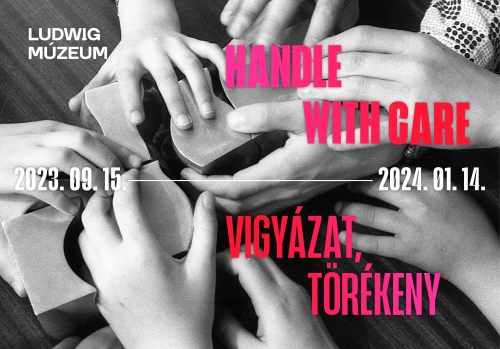The Ludwig Museum will present a new temporary exhibition exploring the theme of caring, and the diversity of the works on display will demonstrate that care is a key concept of our time with a critical potential that cannot be neglected.
Caring is a common experience for all of us, and it shapes our lives from the moment of birth until death. It can be interpreted on the personal level (self-care) or projected onto relationships between people (maternal or parental care, elderly care), but can also be extended to caring for natural beings and, in a broader sense, for the Earth itself. The multifaceted concept of care also has strong economic and political dimensions: care crisis, care migration, global care chains and their impact are among the most pressing issues of our time.
The exhibition’s title Handle with Care refers to the vulnerability of those in need of care, the asymmetrical relationship between carer and cared for, the fragility of life and our ecosystem, and the cracks and gaps in the social care system, but most of all, it calls attention to the need for collective responsibility. Finally, it can also be applied to the role of the museum itself, which, beyond the careful management of artworks, faces new tasks and challenges that affect society.
In a time of multiple crises – health, natural, economic, financial crisis –the exhibition seeks to answer the question of how to interpret the changing notion of care and the role of art (and the museum) in rethinking it. Bearing in mind the original meaning of the word curator (curare: to care, to nurture, to heal), what are the pillars of a ‘caring’ museum? How can a cultural institution become more sensitive to social issues, more inclusive, more open, more accessible, in short, a place for community-building?
The exhibition is the initial stage and (partial) result of the collaboration between a museum educator and artist, Rita Dabi-Farkas, and an art historian and curator, Viktória Popovics, who seek to respond to the growing “care crisis” that is pervading both society and art institutions. One of the cornerstones of the exhibition is Hajnalka Tarr’s participatory community project, which creates a symbolic monument to the many hands that carry out the work of nursing, caring and healing every day. One of the aims of the work, which bears the title of the exhibition, is to use art to make visible all that is impossible or difficult to express in numbers. The works displayed do not deal with specific themes, but rather explore the interconnectedness of issues, including motherhood and related taboo themes, the status and unequal distribution of caring activities, individual and collective aspects of caring, and the healing potential of art. This exhibition presents real situations and raises questions rather than providing ready answers to these problems.
The resulting exhibition is seen as the first stage of a long-term programme, which we would like to use to reach out to new, broader audiences beyond the museum’s usual, relatively limited audience of visitors. Beyond the physical walls of the exhibition space, we will also use the communal spaces of the museum building (staircase, ticket office, library, Lumi Space) and the exhibition will extend to external venues (Hospice House, Day Care Centre for the Mentally Disabled).
Download the EXHIBITION BOOKLET HERE.
Concept: Viktória Popovics
Curators: Rita Dabi-Farkas, Viktória Popovics
Exhibiting Artists:
BAGLYAS Erika, Maria BARTUSZOVÁ, Oksana BRIUKHOVETSKA, Elina BROTHERUS, Seba CALFUQUEO, Alexandr CHEKMENEV, Phil COLLINS, Anna DAUČÍKOVÁ, EPERJESI Ágnes, ESTERHÁZY Marcell, FAJGERNÉ DUDÁS Andrea, FÁTYOL Viola, Andreas FOGARASI, Coco FUSCO, Anna HULAČOVÁ, Sanja IVEKOVIĆ, KIS Judit, LŐRINCZ Réka, Kateryna LYSOVENKO, MATERNAL FANTASIES, OLÁH Norbert, Oláh Mara OMARA, Kateřina ŠEDÁ, SZÁSZ Lilla, SZENES Zsuzsa, TARR Hajnalka, TRANKER Kata, VÉKONY Dorottya, Stephanie WINTER
External location | Hungarian Hospice Foundation, Kenyeres st. 18-22.: KASZÁS Tamás, LORÁNT Anikó
Documentaries: BOGNÁR Benedek & SIMON Zsuzsi – SZALKAI Dániel, DABI István M. – DABI-FARKAS Rita
Contributors: ERDEI Krisztina, JÁSDI Juli, KÁLLAY Eszter, PÓCSIK Andrea és OLÁH Norbert, RomaMoMA Nomadic Library, Romani Design
The exhibition is on view until 14 January 2024.
































